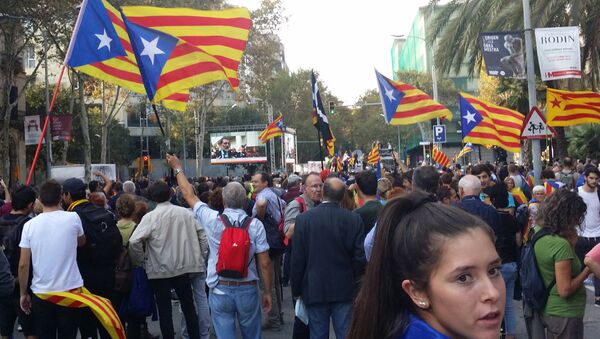According to Niubo, Iceta will be able to secure "sufficient support for [his] leadership."
"The supporters of independence are unlikely to get the absolute majority, and the leader of Citizens [party] is not supported by any other political force. Miquel Iceta may get the support of Citizens, on one hand, and Catalonia in Common [party], on the other hand. Possibly, of somebody else," Niubo said.
The politician said that neither independence supporters, nor supporters of Spain's territorial integrity would get the absolute majority, so the coalition talks would play an important role.
READ MORE: Belgian Authorities End Proceedings Against Ousted Catalan Leaders
The Socialists will not accept the government intent on achieving Catalan independence, but they would not support Ines Arrimadas, the leader of Citizens, as the head of Generalitat, he claimed.
"We will never support those who want to follow down the path of the unilateral declaration of independence. But we do not want to turn to the right either. We are a center-left force and will be comfortable in the government that will work to achieve political and economic stability while preserving social guaranties," Niubo said.
The socialists are proposing a series of reforms, above all, a constitutional one, which would improve the financing of Catalonia and self-governing mechanisms.
Niubo said that the reforms could garner support of about 70-80 percent of the voters, and it would help overcome the existing divide.
The candidate said that the actions of the previous government led to the negative consequences for Catalonia, including the loss of prestige for local universities, companies fleeing the region, lower income from tourism and, most importantly, split society.
Niubo also noted that Madrid's handling of the crisis was within the law.
"One may criticize the actions of the police on October 1, which we consider excessive and which were criticized around the world, but the rest was the use of the existing legislation," Niubo said.
The politician also said that it was time for Catalonia and Spain to "turn the page," when asked about former Generalitat members against whom Madrid initiated legal proceedings.
READ MORE: Spain Jails Eight Pro-Independence Catalan Ministers
"If supporters of independence are willing to take part in debates on constitutional reform, give up on the unilateral way and work on searching for the agreement within the law, then we should try to overcome the divide," Niubo said.
A recent Metroscopia poll showed that 43.8 percent of the voters were planning to choose pro-independence parties, while 44.9 percent were favoring constitutional parties. Ciudadanos was leading the poll with 25.2 percent, followed by pro-independence the Republican Left of Catalonia with 23.1 percent.
The 2017 regional elections that are scheduled on December 21 were called by Prime Minister Mariano Rajoy after the invocation of Article 155 of the Spanish Constitution of 1978, imposing Madrid's direct rule over Catalonia.




